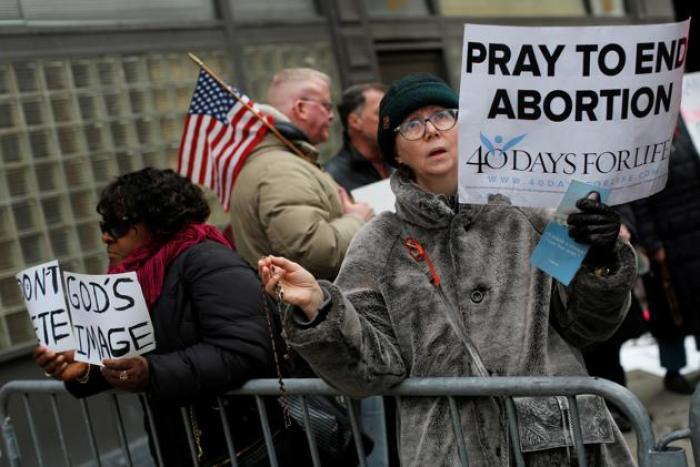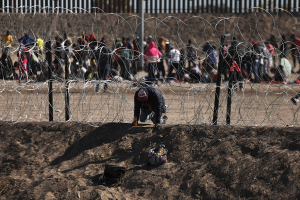Having an Abortion Against Her Will?

Lost in the holiday shuffle—a horrific story of reproductive coercion. A doctor spiked his girlfriend's tea with abortion pills, causing an abortion of her wanted pregnancy. Sikander Imran remains in Virginia's Arlington County Detention Center while he awaits trial, scheduled to begin in March.
People on all sides of the abortion debate are rightly concerned when fraud and deception lead to an unwanted abortion.
Yet very little is said or done about the subtler and even overt psychological coercion which drives many women to abortion.
I touched on how it can be coercive for an attendant to grip a woman's hand to keep her in place if she tries to exit before an abortion procedure begins in a recent op-ed about the rise of the abortion doula. Some readers objected, saying women are knowingly and fully cooperating in every case short of violent force. Even as I took accountability for failing to stand up to the coercion I experienced personally, and though I bore responsibility for failing as the last line of defense when my child's life ended by abortion, one reader stated that since I was not conscripted, he did not accept that I was coerced, and he rejected the idea that abortion victimizes women.
But, as much as some would like to blame women and re-victimize them, coercion is real and far more prevalent than is widely known or understood.
According to lawdictionary.org, coercion is any force, including psychological measures, which compels someone to act against their own will. Coercion is defined as: Compulsion; force; duress. It may be either actual, (direct or positive) where physical force is put upon a man to compel him to do an act against his will, or implied, (legal or constructive.) where the relation of the parties is such that one is under subjection to the other, and is thereby constrained to do what his free will would refuse.
Acting against one's own free will is a subtlety that can be very difficult to grasp, especially for the victim of coercion. The pro-abortion rhetoric of "choice" makes this dynamic even more damaging to the recovery efforts of a woman who was ambivalent or clearly against abortion, and yet who had one anyway.
In some cases, the coercion is blatant and obvious:
- If parents threatened abandonment, did the teen choose abortion freely?
- If violence was threatened or enacted, did the woman choose abortion freely?
Often such women have refused abortion, and they bore the cost—some even experiencing violence rather than abort. Their strength and courage is hard to fathom in the face of such real and present danger. A 2001 Maryland study in the Journal of the American Medical Association found "a pregnant or recently pregnant woman is more likely to be a victim of homicide than to die of any other cause," and, over a six-year period in Maryland, more than 20 percent of maternal deaths were due to partner violence.
But in other cases, intimidation is absent. Instead, coercion takes on a manipulative exploitation of the imbalance of power. This is often accomplished by a woman perceiving herself as more dependent and vulnerable due to her pregnancy than perhaps she was beforehand.
- If a man refused to carry out prior promises and then withdrew financial and other material support, did the woman choose abortion freely?
- If a pastor told his young counselee to quietly abort to save her family's reputation, did she choose it freely?
- If everyone she consulted advocated for abortion, and no one offered an alternative, did she choose it freely?
These scenarios appear very much like an exercise of free will. No one is 'making' her do it. But if she feels in subjection to partner, parents and even friends—if they represent her only social support—she may indeed suffer coercion.
And if she willingly subjects herself to a medical provider who in self-interest fraudulently misstates information about fetal development, abortion risks or other pertinent facts, coercion may occur as well.
Although there's little direct attention paid to the problem, according to theunchoice.org unwanted and coerced abortions are common in America:
Coercion can be direct, indirect or both, often working synergistically during narrow windows of vulnerability or duress. It may involve unethical, negligent or profit-driven counseling. It may include pressure from one's family, support network or authorities; substandard medical and professional practices; or abuses of power in various sectors of society. Coercion may happen in schools, medical offices, or even in the helping professions. In other cases, it may involve personal, emotional, financial or other forms of blackmail, threats, abuse or violence.
When coupled with the dynamic of anxiety-driven poor decision-making, women who are pregnant and lack support are targets ripe for coerced abortion. In fact, some research findings state two-thirds of women who abort feel pressured to do so. New research shows the damage this pressure can do in the emotional lives of women after elective abortion.
Some say abortion empowers women. They seldom mention that it accomplishes that freedom at the expense of their children's lives.
Will they admit this devaluing of our children also emboldens those who abuse and exploit women in their most vulnerable states?
(Kim Ketola is the host and executive producer of Cradle My Heart Today, a companion to her award-winning book Cradle My Heart, Finding God's Love After Abortion. Kim's radio work earned her induction into the Minnesota Broadcasting Hall of Fame in 2013. Cradle My Heart is a safe space for listeners to share stories and connect with others who are finding God's love—especially during unintended pregnancy and after abortion.)




























